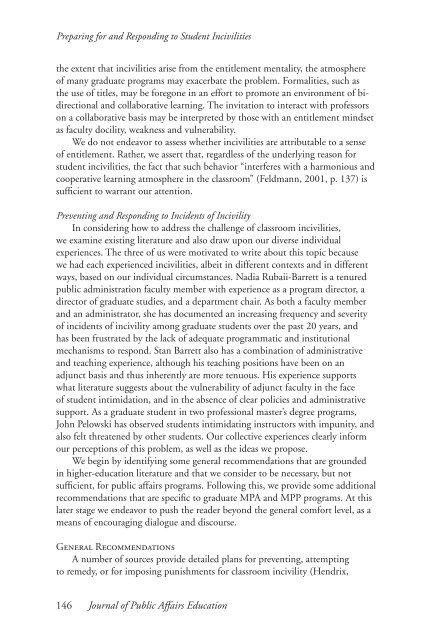JOURNAL OF PUBLIC AFFAIRS EDUCATION - Naspaa
JOURNAL OF PUBLIC AFFAIRS EDUCATION - Naspaa
JOURNAL OF PUBLIC AFFAIRS EDUCATION - Naspaa
You also want an ePaper? Increase the reach of your titles
YUMPU automatically turns print PDFs into web optimized ePapers that Google loves.
Preparing for and Responding to Student Incivilitiesthe extent that incivilities arise from the entitlement mentality, the atmosphereof many graduate programs may exacerbate the problem. Formalities, such asthe use of titles, may be foregone in an effort to promote an environment of bidirectionaland collaborative learning. The invitation to interact with professorson a collaborative basis may be interpreted by those with an entitlement mindsetas faculty docility, weakness and vulnerability.We do not endeavor to assess whether incivilities are attributable to a senseof entitlement. Rather, we assert that, regardless of the underlying reason forstudent incivilities, the fact that such behavior “interferes with a harmonious andcooperative learning atmosphere in the classroom” (Feldmann, 2001, p. 137) issufficient to warrant our attention.Preventing and Responding to Incidents of IncivilityIn considering how to address the challenge of classroom incivilities,we examine existing literature and also draw upon our diverse individualexperiences. The three of us were motivated to write about this topic becausewe had each experienced incivilities, albeit in different contexts and in differentways, based on our individual circumstances. Nadia Rubaii-Barrett is a tenuredpublic administration faculty member with experience as a program director, adirector of graduate studies, and a department chair. As both a faculty memberand an administrator, she has documented an increasing frequency and severityof incidents of incivility among graduate students over the past 20 years, andhas been frustrated by the lack of adequate programmatic and institutionalmechanisms to respond. Stan Barrett also has a combination of administrativeand teaching experience, although his teaching positions have been on anadjunct basis and thus inherently are more tenuous. His experience supportswhat literature suggests about the vulnerability of adjunct faculty in the faceof student intimidation, and in the absence of clear policies and administrativesupport. As a graduate student in two professional master’s degree programs,John Pelowski has observed students intimidating instructors with impunity, andalso felt threatened by other students. Our collective experiences clearly informour perceptions of this problem, as well as the ideas we propose.We begin by identifying some general recommendations that are groundedin higher-education literature and that we consider to be necessary, but notsufficient, for public affairs programs. Following this, we provide some additionalrecommendations that are specific to graduate MPA and MPP programs. At thislater stage we endeavor to push the reader beyond the general comfort level, as ameans of encouraging dialogue and discourse.General RecommendationsA number of sources provide detailed plans for preventing, attemptingto remedy, or for imposing punishments for classroom incivility (Hendrix,146 Journal of Public Affairs Education
















